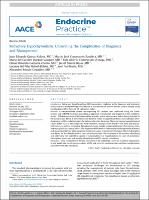| dc.contributor.author | Quiroz-Aldave, Juan Eduardo | |
| dc.contributor.author | Concepción Zavaleta, Marcio José | |
| dc.contributor.author | Durand-Vásquez, María del Carmen | |
| dc.contributor.author | Concepción-Urteaga, Luis Alberto | |
| dc.contributor.author | Gamarra Osorio, Elman Rolando | |
| dc.contributor.author | Suárez-Rojas, Jacsel | |
| dc.contributor.author | Rafael-Robles, Luciana del Pilar | |
| dc.contributor.author | Paz-Ibarra, José | |
| dc.contributor.author | Román-González, Alejandro | |
| dc.date.accessioned | 2023-12-14T15:23:52Z | |
| dc.date.available | 2023-12-14T15:23:52Z | |
| dc.date.issued | 2023-09-04 | |
| dc.identifier.citation | Endocrine Practice. 2023; 29(12). | es_PE |
| dc.identifier.uri | https://hdl.handle.net/20.500.12959/4706 | |
| dc.description.abstract | Introduction: Refractory hypothyroidism (RH) represents a challenge in the diagnosis and treatment
within the field of thyroidology. It is defined as the inability to achieve disease control despite using
levothyroxine (LT4) doses of 1.9 mg/kg/d or higher.
Methods: A comprehensive review, encompassing 103 articles, was conducted using the Scielo,
Scopus, and EMBASE databases, providing an approach to evaluation and diagnosis of this condition.
Results: LT4 disintegrates and dissolves within an acidic gastric environment before being absorbed in
the jejunum and ileum. It then extensively binds to serum transporter proteins and undergoes deiodination
to yield tri-iodothyronine, the biologically active hormone. There are various nonpathological
causes of RH, such as noncompliance with treatment, changes in the brand of LT4, food and drug interferences,
as well as pregnancy. Pathological causes include lactose intolerance, Helicobacter pylori
infection, giardiasis, among others. The diagnosis ofRH involves conducting a thorough medical history
and requesting relevant laboratory tests to rule out causes of treatment resistance. The LT4 absorption
test allows for the identification of cases of malabsorption. The treatment of RH involves identifying
and addressing the underlying causes of noncompliance or malabsorption. In cases of pseudomalabsorption,
supervised and weekly administration of LT4 may be considered.
Discussion: Early recognition of RH and correction of its underlying cause are of utmost importance,
as this avoids the use of excessive doses of LT4 and prevents cardiovascular and bone complications
associated with this condition. | es_PE |
| dc.format | application/pdf | es_PE |
| dc.language.iso | eng | es_PE |
| dc.publisher | American Association of Clinical Endocrinology | es_PE |
| dc.relation.uri | https://www.sciencedirect.com/science/article/pii/S1530891X23005566 | es_PE |
| dc.rights | info:eu-repo/semantics/openAccess | es_PE |
| dc.rights.uri | https://creativecommons.org/licenses/by-nc-sa/4.0/ | es_PE |
| dc.subject | Hypothyroidism | es_PE |
| dc.subject | Thyroxine | es_PE |
| dc.subject | Patient compliance | es_PE |
| dc.subject | Malabsorption syndromes | es_PE |
| dc.subject | Therapeutics | es_PE |
| dc.title | Refractory hypothyroidism: unraveling the complexities of diagnosis and management | es_PE |
| dc.type | info:eu-repo/semantics/article | es_PE |
| dc.subject.ocde | https://purl.org/pe-repo/ocde/ford#3.02.18 | es_PE |
| dc.identifier.doi | https://doi.org/10.1016/j.eprac.2023.09.003 | |






